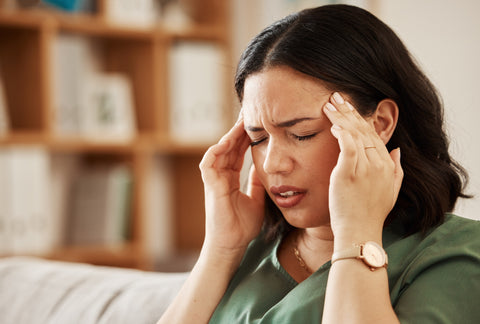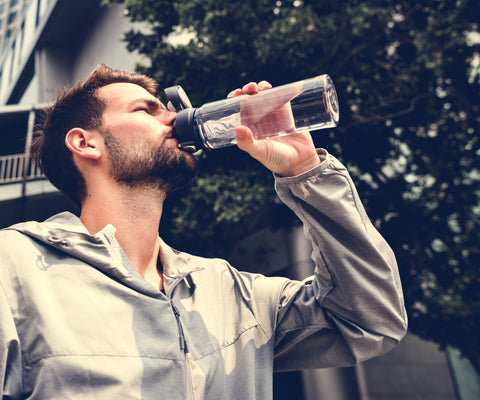Caffeine and Headaches: Everything You Need to Know

For many of us, the day doesn't start until that first sip of a rich, aromatic coffee hits our taste buds. Caffeine has become the unsung hero in our daily routines, often relied upon for that much-needed jolt of energy to kickstart the day or beat the afternoon slump.
But what happens when that cup of joe is also the harbinger of those dreaded tension or migraine headaches? And what about the notorious caffeine withdrawal headache that strikes without mercy when we try to give up or cut back?
Here's the in-depth exploration you've been looking for – the complex relationship between caffeine consumption, caffeine withdrawal, and headaches. Fasten your seatbelts as we take you on this stimulating ride through the world of caffeine and its impact on your head.
The Chemistry of Caffeine: A Brief Overview
Before we dive into the complexities, it's crucial to understand what caffeine is and how it works. Caffeine is a natural stimulant found in the seeds, nuts, and leaves of various plants. At its core, caffeine is a chemical compound that can block the activity of adenosine, a neurotransmitter regulator that promotes sleep and relaxation. In doing so, caffeine can make us feel more alert and focused.
Where is Caffeine Found?
Caffeine can be found in coffee, tea, chocolate, energy drinks, some medications, and even yogurt! However, the most common sources are those sacred coffee beans and the humble tea leaves, where caffeine is more concentrated than in other sources.
The Buzz in Your Brain
Upon consumption, caffeine is swiftly absorbed into the bloodstream from the gut, and it peaks in your blood within 30 to 60 minutes. Once there, caffeine's magic begins. It looks like adenosine (a sleep-inducing agent) and can bind to adenosine receptors in the cells, blocking the natural sleep pathway.
This, in turn, leads to increased neuron firings. As the brain's pituitary gland notices this activity, it assumes that an emergency is afoot – something akin to a mistaken ”Fight or Flight” alert. It then directs the adrenal glands to release hormones that lead to a boost in adrenaline, causing that familiar jolt of energy.

Headache Pain Explained
Headaches are like lost keys; they come in different forms, and they seem to vanish as mysteriously as they appear. Yet, the experience is remarkably distinguishing, and therein lies the key to understanding what's really at the root of your head pain.
What Causes a Headache?
The beginning stages of a headache happen when blood vessels around the brain change. These blood vessels can swell or tighten, which puts pressure on the surrounding nerves. The brain perceives this pressure as pain, which is what we identify as a headache.
What Causes a Migraine?
Far from a simple throbbing in the head, migraines can bring on intense, sometimes debilitating, pain. They often come with additional symptoms like sensitivity to light and sound, though the experience can differ vastly from person to person. Migraines can last for hours and even days, making them a major inconvenience in the lives of sufferers. Moreover, they can be influenced by many factors, including diabetes.
What Causes Tension Headaches?
Often described as a tight band around the head, tension headaches can cause a constant dull ache. Muscle tension or contraction causes tension headaches. It’s important to note there are several reasons why muscles contract, including stress, depression, head injuries, and anxiety.
The Stealth of Caffeine Withdrawal Headaches
The least welcome of the trio, caffeine withdrawal headaches, are not only annoying but can also be amongst the more persistent headaches one can endure. Attempting to give up caffeine "cold turkey" is often blamed for these headaches, which can be quite severe and lead to a longing for the comfort of your nearest caffeinated beverage. Other caffeine withdrawal symptoms include fatigue, irritability, and difficulty concentrating.

Caffeine's Double-Edged Sword: A Remedy and Cause
Caffeine is indeed a fickle friend when it comes to headaches. It has the potential to alleviate certain types of headaches, such as migraines, which is why it's even used as an ingredient in some over-the-counter headache medications. On the other hand, consuming too much caffeine can also bring about headaches, particularly migraines, in those who are susceptible.
Here are all the ways caffeine and headaches are intertwined:
Can Caffeine Help Headaches?
Who knew? Turns out caffeine can help with headaches. Because of this, many popular pain relievers actually contain it. Caffeine reduces inflammation, which provides relief.
Caffeine is especially effective in treating hypnic headaches, a very rare condition mainly affecting older persons. Patients who get these are typically advised to drink coffee before bed.
When the Sip Is Too Deep: Caffeine Overload
However, excessive caffeine consumption can put a damper on your day by causing headaches, which often feel like tension headaches. This is especially problematic for individuals who are not regular caffeine consumers but occasionally indulge in a high-caffeine drink.
Withdrawal Woes: Caffeine's Revenge
And then there is caffeine withdrawal syndrome, haunting those who try to wean themselves off high caffeine intake. Symptoms can range from headache to irritability to flu-like fatigue. To think, it all starts with just a simple cup of coffee.

Taming the Beast: Managing Caffeine and Headaches
Caffeine doesn't have to be the villain in your headaches story. By finding a balance and managing your caffeine intake, you can enjoy the benefits of caffeine without the added caffeine headaches or acute migraine.
Moderation, Not Cancellation
The key to managing frequent headaches related to caffeine is to be judicious in your consumption. For many, this means setting a daily caffeine limit and sticking to it. The goal isn't necessarily to eliminate caffeine but to find the sweet spot where it brings you energy without the subsequent caffeine headache.
The Pillars of Prevention: Hydration, Diet, and Lifestyle
Good health is often the best prevention. Making sure you're well-hydrated, eating regular meals, and getting enough sleep can all contribute to keeping a caffeine headache at bay. Often, these lifestyle factors are the root cause of caffeine's headache-inducing behavior.
Settling the Stress: Mind-Body Approaches
Managing stress levels can reduce the incidence of tension headaches. Mindfulness practices, regular exercise, and ensuring you take breaks during the day to relax and reset can all make a significant difference.
Apply Menthol
Research has shown that when menthol is applied to the skin, it may help to reduce inflammation. If the headache was caused by tension, then menthol may help. Since the active ingredient in peppermint oil is menthol, applying a few drops of peppermint oil to the temples or forehead may help. Please be sure to read the packaging to be sure that the oil can be safely applied to the skin without dilution.
Drink Plenty Of Water
Staying hydrated is important for overall health and can help prevent headaches. When you drink caffeinated beverages, they act as a diuretic and can cause dehydration. As dehydration occurs, the brain shrinks. This small volume change is enough to trigger a headache.
Drinking plenty of water throughout the day will help keep your body hydrated and may help prevent headaches. The volume of fluid needed to stay hydrated is different for every person. A good guide is to check your urine stream when you pee. If your urine is dark yellow, that is a sign of dehydration. A clear urine stream indicates hydration.

Limit Your Intake
If you're used to drinking large amounts of caffeine, cutting back gradually can help minimize withdrawal symptoms like headaches. Try reducing your intake by 25% each week until you're down to a manageable level.
If you’ve determined that you’re highly susceptible to caffeine headaches, the best thing you can do is to cut back on your caffeine intake. If you cut back too quickly, you may experience withdrawal symptoms like headaches, fatigue, irritability, and difficulty concentrating.
To avoid these symptoms, reduce your intake slowly. If you normally drink two cups of coffee a day, try cutting back to just one cup a day for a few days, then dropping to one cup every other day, then every two days, and so on.
Apply Ice to Your Neck
Since caffeine withdrawal headaches are caused by the expansion of blood vessels, remedies that restrict blood vessels can ease this pain. If you are trying to reduce your caffeine consumption then we will try to steer clear of reaching for a coffee to abate your headache. Instead, try applying ice to your neck.
Research has shown that the cold works to quickly constrict the blood vessels and reduce the pain associated with headaches. Try applying the ice pack over your carotid artery. There are two carotid arteries, one on either side of your neck. The cold compress may help to alleviate your headache.
Release Pressure Points
Acupressure, or applying pressure to certain pressure points, has been used in Chinese medicine to temporarily release pains throughout the body. The pressure point that corresponds to headache pain is LI-4. It is located on the back of the hand, at the base of the thumb and index finger. Try applying pressure to this location on each hand for five minutes on each side to ease headache pain.

Eat Regularly
Eating regularly, especially before consuming caffeine, can help reduce the likelihood of caffeine headaches. This is because caffeine is absorbed into the bloodstream and travels to the brain more quickly when you are hungry.
Eating regular meals can slow down this process and help prevent headaches. Eating at the same time every day can also help you regulate your caffeine intake and meal schedule.
Coffee and caffeine-containing foods can also cause indigestion, heartburn, and general discomfort for those sensitive to caffeine. Eating regularly can help regulate your caffeine intake and prevent this discomfort.
Talk To Your Doctor
If you're experiencing severe or persistent headaches, talk to your doctor. They can rule out other causes and help you find a treatment that works.
Migraine pain could also be another reason you’re getting headaches. If you suffer from migraines, it might be worth checking in with a doctor to see how you can manage them. Caffeine can trigger migraines in some people, so cutting back on your intake may help reduce the frequency of your headaches.
The migraine patient will be medically reviewed for other causes that may be causing the headaches before being given a diagnosis of caffeine headache. Afterward, the doctor will help you find a treatment that works for you.
Exercise Regularly
Regular exercise can help reduce caffeine-related headaches, fatigue, and stress. Increasing your physical activity can prevent you from consuming too much caffeine in the first place, which may help you avoid caffeine headaches completely.
Exercising regularly can also help you get better sleep at night, which can help you avoid caffeine headaches in the morning. Regular exercise can also help reduce diet-related caffeine headaches and other types of headaches.
If you experience caffeine headaches frequently, try to exercise regularly and see if your headaches decrease.
Find a Dark Room And Relaxation Time
If you’re experiencing caffeine-induced headaches, try dimming your lights and taking some time to relax to help alleviate the pain. If you’re experiencing a caffeine headache, you may want to avoid bright lights and loud noises to help soothe the pain.
If this is the case, try to get to a quiet and dimly lit room, relax for a few minutes, and see if the pain goes away. This may allow you to wait out the caffeine headache and avoid taking painkillers or other medications.

FAQs
Q: How does caffeine affect the body besides providing energy?
A: Caffeine can also increase heart rate and blood pressure, act as a diuretic, and affect calcium absorption in the bones.
Q: What is GOOD IDEA and how does it provide natural energy?
A: GOOD IDEA is a sparkling water beverage that contains a blend of five amino acids and chromium, which can help to reduce the post-meal blood sugar spike that often leads to an energy crash. It helps us to sustain our normal energy levels by regulating blood sugar, without relying on caffeine. So when you're looking for a refreshing drink that won't leave you with a headache, give GOOD IDEA a try!
Q: How much caffeine is too much?
A: The recommended daily limit for adults is 400 mg of caffeine, which is equivalent to about four cups of coffee. However, this can vary depending on an individual's tolerance and sensitivity to caffeine.
Q: Can I get withdrawal headaches from quitting caffeine?
A: Yes, quitting caffeine cold turkey can cause withdrawal headaches. It's essential to gradually reduce your caffeine intake to avoid this discomfort.
Q: Are there any other ways to relieve headaches besides taking medication?
A: Yes, there are several non-medical approaches you can take to alleviate headaches. These include practicing relaxation techniques, staying hydrated, and getting enough sleep. It's also essential to address any underlying stress or lifestyle factors that may be contributing to your headaches.
Q: Can consuming too much caffeine cause long-term health problems?
A: Yes, excessive caffeine consumption can lead to various health issues such as anxiety, high blood pressure, and insomnia. It's essential to keep your caffeine consumption in check.
Q: Can certain foods or drinks aggravate headaches?
A: Yes, certain trigger foods and beverages, such as aged cheese and red wine, can cause headaches in some individuals. It's essential to pay attention to your diet and identify any potential triggers for your headaches.
Q: Is caffeine addiction a real thing?
A: While caffeine itself is not chemically addictive, it can lead to psychological dependence and cravings, making it difficult for some individuals to reduce their caffeine intake.
Q: Is caffeine present in other foods or beverages besides coffee and tea?
A: Yes, caffeine can also be found in energy drinks, soda, chocolate, and some medications.
All in All . . . Happy Head, Happy Life
Understanding the nuanced relationship between caffeine and headaches can be a game-changer for those who suffer from this common ailment. While caffeine's effects on our bodies can be complex and varied, with a little knowledge and mindfulness, we can harness its powers for good – enhancing our lives without unnecessary headaches.
Remember, the solution isn't to fear the coffee pot; it's to appreciate the delicate balance that makes the difference between a headache and a perfectly crafted day.
Looking for a drink to fuel your day without the headaches? Try GOOD IDEA, the sparkling water with a functional twist. By helping to control post-meal blood sugar levels, GOOD IDEA can help to reduce the extreme highs and lows in energy that accompany blood sugar spikes. In this way, it is a functional drink that can help sustain energy levels without caffeine.
Want to know more? Check out the science here!



